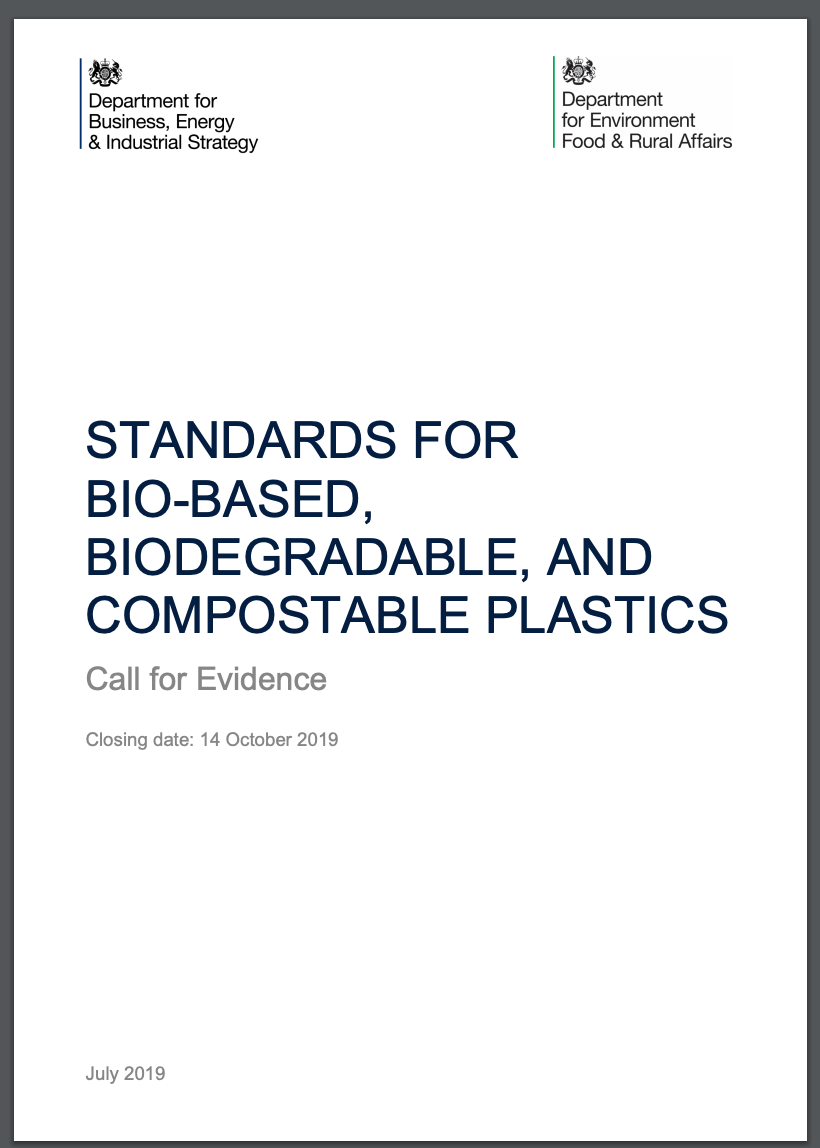The UK Government is seeking evidence to identify gaps and to provide expert advice on:
a) The overall sustainability of bio-based and biodegradable plastic products, particularly when in comparison with those made from other materials. This could include all aspects of a product’s life-cycle and will help in assessing whether technical standards or other related options are suitable mechanisms to add value for such products;
b) Existing relevant plastic degradation standards and how, or if, they might be promoted without any adverse effects on the environment and disposal routes;
c) The design and implementation of standards for biodegradable plastics to ensure that they fully biodegrade in a reasonable timeframe in specified environments.
The announcement is part of the Smart Sustainable Plastic Packaging challenge, through Industrial Strategy Challenge Fund, delivered by UK Research and Innovation. It builds on the UK Bioeconomy Strategy and government’s Resources and Waste Strategy which sets out its plans to overhaul the waste system, cut plastic pollution, and move towards a more circular economy.
The Industrial Strategy sets out how the whole of the UK can build on its strengths, extend them into the future, and capitalize on new opportunities. Investing in science and research to keep the country at the forefront of new technologies and the benefits they bring.
CLICK HERE FOR ONLINE SURVEY: https://beisgovuk.citizenspace.com/im/biodegradable-compostable-biobased-plastics/
Consultation details Issued: 22 July 2019
Respond by: 14 October 2019
Enquiries to:
Peter Cottrell
Bioeconomy and Plastics Team Department for Business, Energy and Industrial Strategy
4th Floor, Orchard 1 1 Victoria Street London SW1H 0ET Tel:020 7215 1330
Email: ukbioeconomystrategy@beis.gov.uk
BACKGROUND:
UK businesses are expected to jointly invest up to £149 million, alongside a £60 million government investment, to help fight the global battle against single-use plastics. This funding could be used to find ways to cut waste in the supply chain, develop new business models and create new sustainable recyclable materials. This could include using plants instead of oils to make plastic, which will help reduce their carbon impact.
This forms part of the government’s Clean Growth Challenge – a key part of the modern Industrial Strategy – and follows the UK becoming the first major economy to legislate to end its contribution to global warming by 2050.
Around 80 million tonnes of plastic packaging is produced annually and if left unchecked, this is expected to triple by 2050. After a short first-use cycle, 95% of plastic packaging is lost to the economy. Brands are increasingly acting on the need to shift away from single-use plastics.
Sainsbury’s has committed to removing 10,000 tonnes this year as well as removing plastic bags from fresh fruit and vegetables and introducing water refill stands in superstores. Today the supermarket chain has announced the removal of all plastic bags for loose fruit and vegetables in Lincoln and Kidlington stores.
Investment through the government’s modern Industrial Strategy is already backing the development of plastics made from plants, and products that degrade easily in an open environment.
Companies behind these innovations include London-based start-up Skipping Rocks Lab, who have created new packaging made from Notpla, a material made from seaweed and plants that only lasts as long as it needs to. This material was used in a trial by Just Eat for their condiments and used as an alternative to plastic bottles at the London Marathon 2019.




